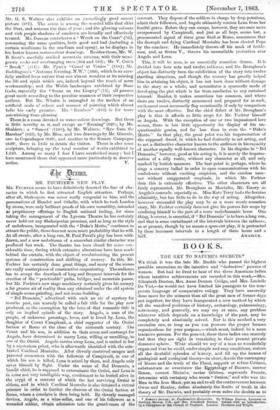MR. FECHTER'S NEW PLAY.
Ma. FECHTER seems to have definitively deserted the line of cha- racter in which he first attracted English attention. Perhaps, after all, Shakespere was never really congenial to him, and the personations of Hamlet and Othello, with which he took London by storm, were only brilliant proofs of his own versatility, intended as propitiatory offerings to English national feeling, for since taking the management of the Lyceum Theatre he has certainly never held out any Shakesperian promises, and as long as the style of melodrama, inaugurated with the "Duke's Motto," continues to attract the public, there does not seem much probability that he will. At all events, after a long run, M. Paul Feval's play has been with- drawn, and a new melodrama of a somewhat similar character was produced last week. The theatre has been closed for some con- siderable time, during which extensive alterations have been made behind the curtain, with the object of revolutionizing the present systems of construction and shifting of scenery. In this, Mr. Fechter has certainly done great things, and many of the scenes are really masterpieces of constructive carpentering. The audience has to accept the drawback of long and frequent intervals for the erection of the " practicable" paths, bridges, and mountain passes, but Mr. Fechter's new stage machinery certainly gives his scenery a far greater air of reality than any obtained under the old system of simple scene-painting, and not scene-building.
" Bel Demonic)," advertised with such an air of mystery for months past, can scarcely be called a fair title for the play now produced, as the assumption by the hero of that romantic title is only an implied episode of the story. Angelo, a man of the people, of unknown parentage, loves, and is loved by, Lena, the daughter of Count Campireali, a chief supporter of the Orsini faction at Rome at the close of the sixteenth century. The Count and his son, in addition to their scorn and contempt for Angelo, have determined to marry Lena, willing or unwilling, to one of the Orsini. Angelo carries away Lena, and is united to her by a mysterious priest, who is afterwards identified with the cele- brated Cardinal Montalto. After cleverly contrived escapes and personal encounters with the followers of Campireali, in one of which his son is killed, Lena is seized by them, and Angelo only saves himself by flight. Under the name of Bel Demonio, a bandit chief, he is supposed to exterminate the Orsini, and Lena is in some not very intelligible way, condemned to be buried alive in the crypt of a convent of which the last surviving Orsini is abbess, and in which Cardinal Montalto is also detained a virtual prisoner in order to further the chances of the Orsini faction at Rome, where a conclave is then being held. By cleverly managed devices, Angelo, as a wine-seller, and one of his followers as a wounded soldier, obtain admission into the guard-room of the convent. They dispose of the soldiers in charge by deep potations, admit their followers, and Angelo ultimately rescues Lena from her fearful grave. Before they can escape, however, they are once more overpowered by Campireali, and just as all hope seems lost, a preconcerted signal of three guns fired at Rome, announces that the decrepit and dying Cardinal Montalto has been elected Pope by the conclave. He immediately throws off his mask of feeble- ness, and, as Sixtus V., throws his unassailable protection over Angelo and Lena.
This, it will be seen, is an essentially sensation drama. It is divided into four acts and twelve tableaux, and Mr. Brougham's object has distinctly been the subdivision of the story into twelve startling situations, and though the scenery has greatly helped him in attaining his object, it has not been done without damage to the story as a whole, and necessitates a spasmodic mode of developing the plot which is far from conducive to any sustained interest. Besides, it makes sensations too common, and where there are twelve, distinctly announced and prepared for as such, excitement must necessarily flag occasionally, if only by comparison with the most effective. But the chief defect of Mr. Brougham's play is that it affords so little scope for Mr. Fechter himself as Angelo. With the exception of one or two impassioned love scenes, there is but little opportunity for display of his un- questionable genius, and far less than in even the " Duke's Motto." In that play, the great point was his impersonation of the supposed dwarf, in which he had distinctly to act acting, and to act a distinctive character known to the audience in his capacity of another equally well-known character. In his disguise in " Bel Demonio," however, good as his acting is, it is merely the imperso- nation of a silly rustic, without any character at all, and only marked by loutish manners. The best point is, perhaps, where he sings a country ballad in order to open communications with his confederate without exciting suspicion, and the careless man- ner without exaggerated emphasis, in which Mr. Fechter does this is extremely effective. The other characters are all fairly represented, Mr. Brougham as Montalto, Mr. Emery as Angelo's comrade, especially so. Miss Kate Terry looks the heroine admirably, but has little to do in the way of acting. Altogether, however successful the play may be as a mere scenic sensation story, Mr. Fechter certainly does not give his powers fair scope by confining himself to the part of a mere melodramatic lover. One thing, however, is essential, if "Bel Demonio" is to have a long run, and that is some curtailment of the intervals between the tableaux, as at present, though by no means a seen-out play, it is protracted by these incessant intervals to a length of three hours and a






























 Previous page
Previous page